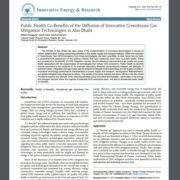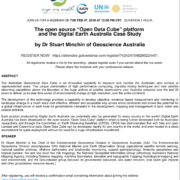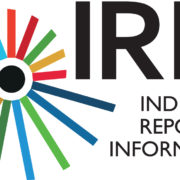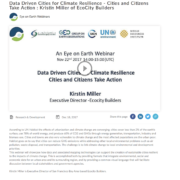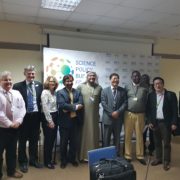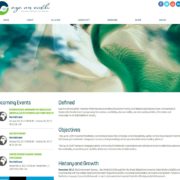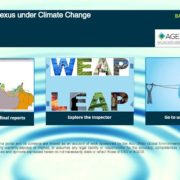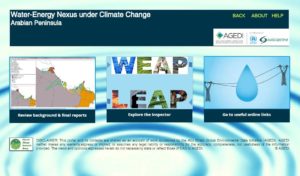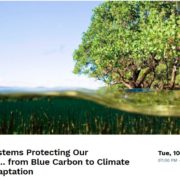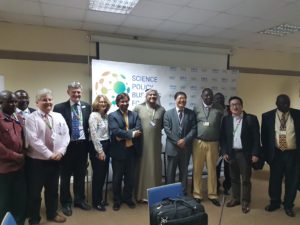
IRIS News Clippings (4750 downloads )
Abu Dhabi, UAE: 20 December 2017: Following a successful collaboration between Environment Agency – Abu Dhabi (EAD) and UN Environment, the Abu Dhabi Global Environmental Data Initiative (AGEDI) launched the Indicator Reporting Information System (IRIS) during the UN Global Science-Policy-Business Forum on the Environment that took place during the third session of the UN Environment Assembly held in Nairobi, Kenya between 4-6 December 2017.
IRIS is an enterprise web application intended for organizations involved in regular environmental status and performance reporting. It is a targeted response to a set of widespread, real world challenges faced by many organizations across the world. Its main aims are to reduce the institutional burden associated with recurring report production and to provide timelier and more complete information for decision makers; in all tiers of Governance – local to global develop; to develop institutional capacity; and be a practical, durable and globally applicable solution.
Ahmed Baharoon, AGEDI’s Acting Director said: “We are very proud to be able to show our stakeholders the result of the hard work between the AGEDI implementation partners to reach the point where IRIS is ready to be launched. We look forward to collaborating with UN Environment even closer in 2018 to deliver IRIS to its users”.
The path forward includes further strengthening the software to ensure its long-term durability; a regional capacity-building workshop for West Asia will be held in Abu Dhabi in Q2 of 2018, as well as the deployment of IRIS in a first batch of interested countries from across the globe. “We look at 2018 with great excitement and anticipation; a substantial number of countries have expressed interest to have the IRIS deployed within their ministries or institutions responsible for environmental reporting. UN Environment will strive to meet this demand and to demonstrate the significant value add that IRIS represents in the global reporting ecosystem.” said Dr. Jian Liu, Chief Scientist at UN Environment.
More information on IRIS can be found at www.agedi.org/iris and www.environmentlive.unep.org/myiris. Queries can be sent to [email protected].
أجيدي تطلق مؤشر نظام معلومات التقارير في منتدى العلوم والسياسات والأعمال أثناء اجتماع جمعية الأمم المتحدة للبيئة في نيروبي
أبوظبي، الإمارات العربية المتحدة: 20 ديسمبر، 2017: استمراراً للتعاون الناجح بين هيئة البيئة – أبوظبي وبرنامج الأمم المتحدة للبيئة، أطلقت المبادرة العالمية للبيانات البيئية (أجيدي) مؤشر نظام معلومات التقارير خلال منتدى العلم والسياسات العامة والأعمال الذي عقد كحدث جانبي على هامش الدورة الثالثة لجمعية الأمم المتحدة للبيئة التابعة لبرنامج الأمم المتحدة للبيئة في مقر برنامج الأمم المتحدة للبيئة في نيروبي، خلال الفترة من 4 إلى 6 ديسمبر 2017.
ومؤشر نظام معلومات التقارير هو تطبيق إلكتروني مخصص للمؤسسات التي تقدم تقارير دورية حول حالة البيئة وأدائها، كما أنه يعتبر استجابة مستهدفة لمجموعة واسعة من التحديات العالمية الحقيقية. وتتمثل أهداف هذا المؤشر في تقليل العبء المؤسسي المرتبط بإعداد التقارير بشكل متكرر، وتقديم معلومات موثوقة وفي الوقت المناسب لصناع القرار، على كافة مستويات الحوكمة – المحلية والدولية، كما يهدف إلى تعزيز القدرات المؤسسية، لتصبح حلاً عمليا ومستقراً وقابل للتطبيق عالمياً.
وقال أحمد باهارون، مدير مبادرة أبوظبي العالمية للبيانات البيئية بالإنابة: “من دواعي سرورنا وفخرنا أننا تمكننا من إطلاع شركائنا على نتائج الجهود الدؤوبة التي بذلتها مبادرة أبوظبي العالمية للبيانات البيئية، بالتعاون مع شركائنا التنفيذيين للوصول إلى مرحلة إطلاق مؤشر نظام معلومات التقارير. ونحن نتطلع إلى تعزيز التعاون مع جمعية الأمم المتحدة للبيئة في عام 2018 ليصل مؤشر نظام معلومات التقارير إلى مستخدميها”.
وتتضمن الخطط المستقبلية تحسين هذا التطبيق لضمان استمراره على المدى الطويل، كما أنه من المقرر أن تستضيف إمارة أبوظبي ورشة عمل إقليمية لبناء القدرات في منطقة غرب آسيا، وذلك في الربع الثاني من عام 2018. بالإضافة إلى تطوير مؤشر نظام معلومات التقارير في أول مجموعة من الدول المعنية من جميع أنحاء العالم.
وفي هذا الصدد قال د. جيان ليو كبير علماء البيئة في الأمم المتحدة: ” نتطلع بشغف إلى عام 2018، حيث عبر عدد كبير من الدول عن اهتمامهم ببرنامج مؤشر نظام معلومات التقارير من خلال وزاراتهم أو مؤسساتهم المسؤولة عن التقارير البيئية. وستسعى الأمم المتحدة للبيئة إلى تلبية طلباتهم، وتوضيح القيمة الكبيرة التي يضيفها مؤشر نظام معلومات التقارير لأنظمة التقارير حول العالم.”
للمزيد من المعلومات حول مؤشر نظام معلومات التقارير، يمكنكم زيارة الموقع الإلكتروني www.agedi.org/iris و الموقع www.environmentlive.unep.org/myiris، كما يمكنكم التواصل للاستفسار عبر البريد الإلكتروني [email protected].

